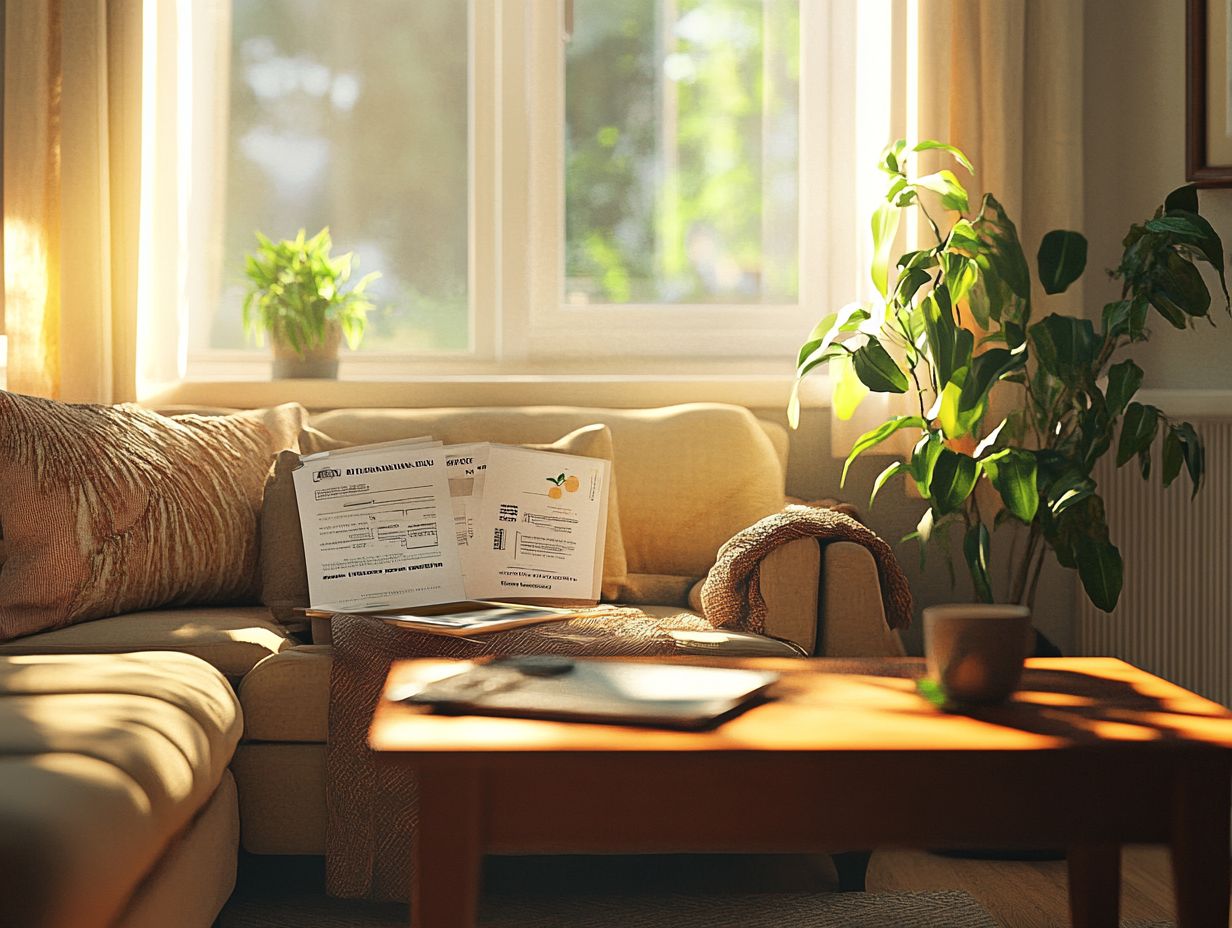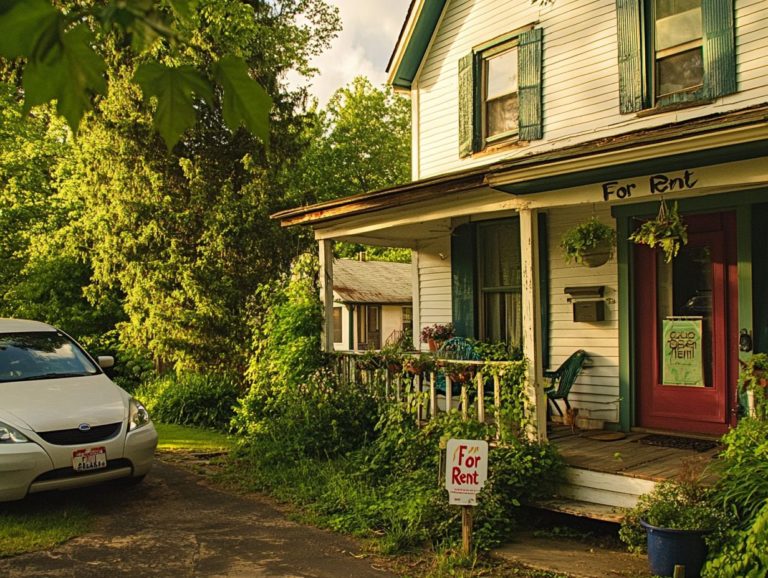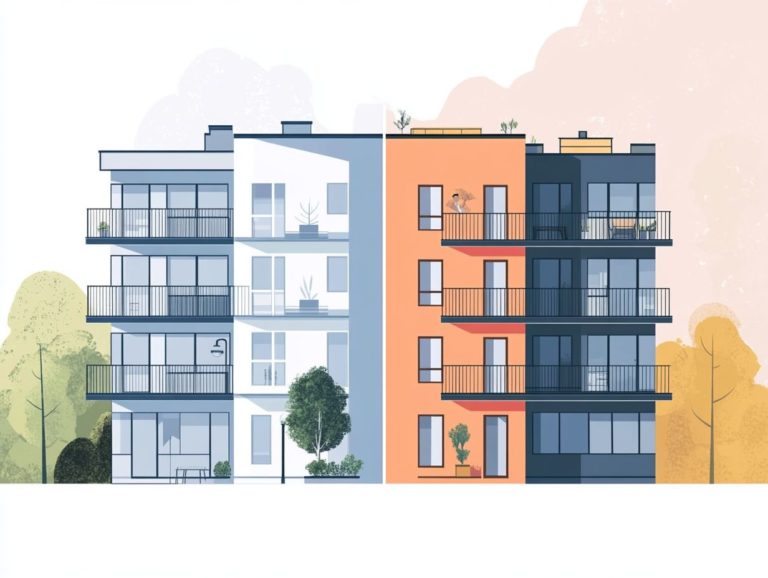5 Key Points About Home Insurance for New Owners
Navigating the world of homeownership can be thrilling yet daunting, particularly when you’re trying to secure the right insurance.
For new homeowners, grasping the significance of home insurance is essential. It offers crucial protection against unforeseen events. This guide will delve into various types of coverage, factors that influence rates, and tips for selecting the most suitable policy.
It will also shed light on common pitfalls to avoid and the risks associated with being uninsured. Armed with the right insights, you ll be well-prepared to protect your valuable investment.
Contents
- Key Takeaways:
- 1. Importance of Home Insurance for New Homeowners
- 2. Understanding the Different Types of Home Insurance Coverage
- 3. Factors That Affect Home Insurance Rates
- 4. How to Choose the Right Home Insurance Policy
- 5. Common Mistakes to Avoid When Purchasing Home Insurance
- What Does Home Insurance Cover?
- Frequently Asked Questions
- What Are the 5 Key Points About Home Insurance for New Owners?
- Why Is Home Insurance Important for New Owners?
- What Types of Coverage Should New Owners Consider?
- What Factors Affect the Cost of Home Insurance?
- How Can New Owners Choose the Right Coverage?
- What Are Common Misconceptions About Home Insurance?
Key Takeaways:
- Home insurance is essential for protecting your investment.
- Carefully consider available coverage types.
- Rates depend on location, coverage type, and deductibles.

1. Importance of Home Insurance for New Homeowners
For new homeowners, understanding homeowners insurance is crucial. It acts as a vital financial safety net against various risks, including property damage from natural disasters and personal liability claims. To navigate this process effectively, be aware of the 5 mistakes to avoid when buying home insurance.
This insurance gives you peace of mind, letting you enjoy your new home. It covers many risks, such as fire, theft, and vandalism, making it a comprehensive shield for your property. Understanding the key facts about home insurance coverage can further enhance your protection.
Mortgage companies typically require buyers to maintain homeowners insurance to protect their investment since the property serves as collateral for the loan. In addition to protecting your physical assets, homeowners insurance also covers personal liability if someone gets injured on your property.
It’s vital to understand insurance policies to safeguard your finances in unexpected situations, giving you the power to make informed decisions.
2. Understanding the Different Types of Home Insurance Coverage
You need to understand the different types of home insurance coverage to protect your property effectively. Options like actual cash value and replacement cost can greatly influence your overall insurance experience.
Actual cash value means you get paid based on the current value of your property, while replacement cost gives you enough money to replace it fully.
Delving into extra coverage options such as personal liability, water backup, or identity theft protection can significantly enhance your policy’s security, addressing your unique lifestyle and individual needs.
3. Factors That Affect Home Insurance Rates
Home insurance rates are shaped by various factors, including risk assessments tied to property damage and your claims history. Each of these elements plays a vital role in determining your overall insurance premiums.
Location is another significant factor that can affect your insurance costs. For example, if your home is in an area prone to natural disasters, you may face higher premiums. The overall value of your home also matters, as more expensive properties typically come with higher coverage costs.
Implementing safety measures, such as alarm systems and fire extinguishers, can lead to potential discounts.
By regularly reviewing your policies, comparing options, and keeping a clean claims history, you can actively manage and potentially lower your premiums. This shows your insurance provider that you pose a reduced risk.
Don’t wait! Start exploring your options today to secure your home!
4. How to Choose the Right Home Insurance Policy

Choosing the right home insurance policy requires careful attention to several factors. Consider coverage options, policy limits, and the reputation of various insurance providers.
It’s important to be diligent to ensure you have adequate protection against potential risks.
Thoroughly evaluating the claims process is vital; understanding how to navigate claims can significantly influence your experience during those stressful moments. It s wise to take the time to compare different providers, looking into their customer service ratings and financial stability to gain peace of mind.
Don t hesitate to seek tailored recommendations from trusted sources, like friends or financial advisors. Their insights can lead you to policies that align more closely with your individual needs, ultimately creating a comprehensive approach to securing your home.
5. Common Mistakes to Avoid When Purchasing Home Insurance
When you’re purchasing homeowners insurance, avoid common mistakes to get good coverage. Many policyholders tend to overlook crucial tips, such as 5 tips for selecting home insurance types and ensuring they adequately account for legal expenses in their coverage.
Review your policy carefully don t miss anything that could cost you later. A common misstep is assuming that a standard policy covers all potential risks, which can lead to underinsurance especially when natural disasters decide to make an entrance.
Understanding your policy limits is key to protecting your investment. Staying informed about the claims process can significantly alleviate stress during emergencies. Seek personalized advice from an experienced insurance agent to enhance your understanding and give you the power to make informed decisions tailored to your unique needs.
What Does Home Insurance Cover?
Home insurance offers comprehensive coverage that protects you from various risks, including property damage caused by insured disasters like fires, floods, and earthquakes.
It also provides additional living expenses, which are costs for temporary housing or services if your home becomes unlivable, and liability coverage in the event of claims. This essential protection not only safeguards the physical structure of your home but also extends to your personal belongings, ensuring that your valuable possessions are covered in case of unforeseen incidents.
Liability coverage serves as a financial safety net, helping you manage any legal responsibilities that may arise from injuries occurring on your property.
When disaster strikes, having coverage for additional living expenses becomes crucial. It assists you in maintaining your standard of living by covering costs related to temporary housing or essential services. This way, you can concentrate on recovery without the added stress of financial burdens weighing you down.
What Are the Different Types of Home Insurance Policies?
Different types of home insurance policies cater to your unique needs, with homeowners insurance distinct from renters insurance. Each is crafted by various insurance providers to address specific risks and coverage requirements.
Homeowners insurance typically offers extensive protection for your home s structure. It covers the physical dwelling against risks such as fire, theft, or natural disasters. Often, it includes liability coverage as well, shielding you from potential lawsuits due to injuries that may occur on your property.
On the other hand, renters insurance zooms in on your personal belongings within a rental unit, providing financial protection against loss or damage from unforeseen events. While it may also offer liability coverage, the key difference is ownership; homeowners protect their property, while renters focus on securing their personal possessions.
Understanding these distinctions gives you the power to select the most suitable policy for your specific living situation.
How Can Homeowners Save Money on Home Insurance?

Homeowners can lower their insurance costs by exploring various discounts from providers and adjusting their deductibles. Being mindful of eligibility for lower premium rates is also important.
Consider bundling your home insurance with auto insurance to enjoy great multi-policy discounts. Enhancing your home s safety features, like installing security systems or smoke detectors, can lead to substantial savings.
Maintaining a clean claims history is crucial. Avoid unnecessary claims to secure better rates.
Look for discounts related to loyalty, being claims-free, or energy-efficient upgrades. By using these strategies, you can effectively lower your expenses while protecting your investments.
What Are the Key Differences Between Homeowners Insurance and Renters Insurance?
Homeowners insurance and renters insurance differ mainly in coverage. Homeowners insurance protects both the home structure and personal belongings, while renters insurance is focused on personal items in a rented space.
Homeowners insurance covers the policyholder’s possessions and structural damage caused by disasters or accidents. If your home suffers damage, this policy helps with repairs or rebuilding costs.
In contrast, renters insurance compensates for personal property loss, like furniture and electronics, but doesn t cover the building itself. It s important to know what each policy protects.
Liability coverage is another key difference. Homeowners insurance usually includes liability protection for accidents on the property. Renters insurance also offers liability protection but focuses on tenant-related incidents.
What Are the Risks of Not Having Home Insurance?
Not having home insurance exposes you to significant risks. You could face financial ruin from unexpected property damage or disaster recovery challenges.
In an unpredictable world, you re vulnerable to many threats, including hurricanes, floods, and theft. Imagine losing your home to a fire without insurance. You could face crippling debts and be left responsible for rebuilding your life.
Recognize that adequate home insurance is a crucial safety net against potential losses. Understanding homeowner liability claims is essential, as this coverage enables a swift recovery and helps you avoid long-term financial struggles.
How Can Homeowners Ensure They Have Adequate Coverage?
To ensure adequate coverage, regularly evaluate your homeowners insurance limits and conduct a thorough inventory of your belongings. Explore various coverage options from reputable providers.
Start by making a detailed inventory of your possessions. Knowing what you have helps clarify what coverage you need. Familiarize yourself with policy limits, as these can impact claims significantly.
Talking to insurance agents can provide personalized insights. Review your insurance annually or after significant life changes to ensure your policies match your current circumstances.
Frequently Asked Questions

What Are the 5 Key Points About Home Insurance for New Owners?
Home insurance is crucial for protecting your investment. Here are the 5 things to know before buying home insurance: its importance, types of coverage, factors affecting rates, how to choose the right coverage, and common misconceptions.
Why Is Home Insurance Important for New Owners?
Home insurance protects you financially against damage or loss. As a new homeowner, understanding the importance of home insurance for first-time buyers helps you avoid hefty repair costs.
What Types of Coverage Should New Owners Consider?
New owners should consider several types of coverage. This includes protection for your home’s structure, personal belongings, and liability for accidents on your property.
What Factors Affect the Cost of Home Insurance?
Home insurance costs vary based on several factors. Key aspects include your home s location, its age, the value of your belongings, and your claims history.
How Can New Owners Choose the Right Coverage?
To find the right home insurance, assess your needs and budget. Compare quotes from different companies and read the policy to understand what it covers.
What Are Common Misconceptions About Home Insurance?
New owners often confuse home insurance with renters insurance. It’s also a myth that it covers all types of damage or that it’s unnecessary if the home is paid off; understanding the essential home insurance types for new buyers can clarify these misconceptions.






